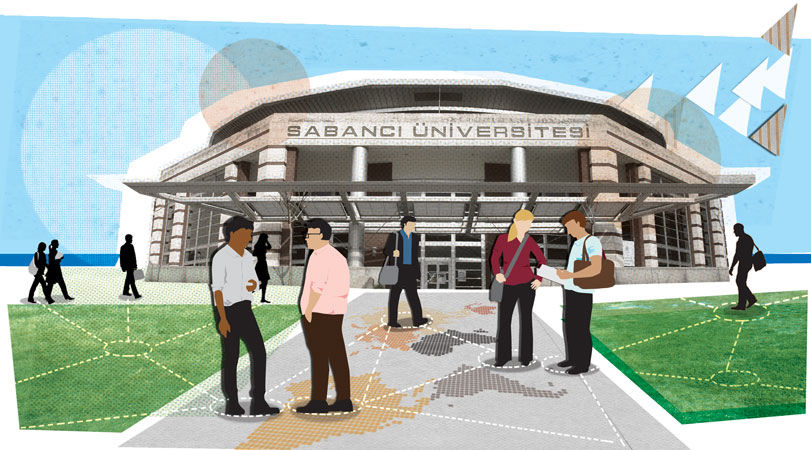We are facing challenges of a global nature that require global citizenship, global responsibility, and global solutions. These cannot be achieved without an increasing cadre of managers who understand the world through global lenses.
As Dean of one of Turkey’s top business schools with strong ties to the business community1, I spend quite a lot of time thinking about what it is our school should be doing to help our students learn about management, acquire the necessary management skills, develop the necessary sensibilities, and ask the relevant questions in order to respond to challenges they will face throughout their careers. Just as I ponder what my students need, I find that top executives also spend much time thinking about how to develop their workforce for the future. At the same time, despite much discussion about how business education needs to change, during the last few decades, only two areas have seen an appreciable difference: the importance given to business ethics and the global context. My interest here is on how business schools and companies can work together to envision the qualities and commitments expected from those who will soon be entrusted with our future. I call these qualities a global mindset, and my goal is to ensure that we have many more managers who possess openness to the multiple realities, perspectives and contexts such a mindset implies. I want more young people to have a global mindset, not only because I believe it will lead to more effective organizations, but because I hope it will lead to a better world. As humanity, we are facing challenges of a global nature that require global citizenship, global responsibility, and global solutions. These cannot be achieved without an increasing cadre of managers who understand the world through global lenses.
What is a global mindset? In the early 2000s my colleagues and I conducted research to understand exactly what constitutes a global mindset. Our then exhaustive research lead to our definition of a global mindset as being the ability to think in complex fashion about the world, cognitive complexity with a positive orientation towards it, cosmopolitanism.2 It is a highly complex cognitive structure characterized by:
• An awareness of and openness to multiple cultural and strategic realities
• Articulation of multiple cultural and strategic dynamics on both global and local levels
• The cognitive ability to mediate and integrate across this multiplicity
While scholarly debate3 does exist on the appropriate conceptualization and measurement of global mindset, in business schools and across the international business community there is strong support that having more individuals with a global mindset is important for organizational success within a global economy.4 A global mindset helps leaders see the world from multiple perspectives, make decisions that work both locally and globally, and increases the ability of their company to compete in the global marketplace.
Is a Global Mindset Important?
“The financial meltdown will not be the last global crisis. The impact of climate change may be even greater.” (Price Waterhouse Coopers 12th Annual CEO Survey, 2009)
You may ask, in view of all the debate around globalization why another essay on global mindset. Hasn’t the financial crisis killed our love affair with globalization? For me, globalization is a term that in the popular vernacular has come to convey; business beyond borders. Yes, regionalization is more the case than globalization, yes the world is not flat but spiky, and yes cultural and institutional differences and the local context continue to be critically important.5 Nevertheless, as humanity, I believe we are facing challenges of a global nature that require global citizenship. Given this global nature of many of the problems we face today, I maintain that helping develop individuals with a global mindset should also perhaps be viewed as a core citizenship requirement. One of the most compelling books of the last decade, Rischard’s High Noon: 20 Global Problems, 20 Years to Solve Them6 makes a strong argument for the importance of working together as a global community to solve problems of how we will share our planet (e.g. global warming), how we will share our humanity (e.g. fighting poverty, disease, war etc.) and sharing of our rulebook (e.g. issues such as a global approach to our financial system).
How can one develop a global mindset?
Carlos Ghoshn and Muhtar Kent are quintessential examples of global leaders. Both embraced opportunities throughout their careers to work in different countries, supported by a myriad of cross-cultural learning experiences while growing up. Ghoshn, born in Brazil, the son of Brazilian and French parents with Lebanese roots, skillfully orchestrated the unlikely joint venture between Nissan and Renault, reviving the former in the process. Kent, born in the U.S. to a Turkish diplomat, successfully chartered the big ship that is The Coca Cola Company in international waters becoming its new chairman and CEO. How can we raise more global leaders like these instead of waiting for them to arrive and save the day?
Selecting individuals with a propensity for developing a global mindset (those with higher levels of cognitive complexity and cosmopolitanism) is important when choosing potential candidates for managers in global companies. Identifying activities and accomplishments in the candidate’s background that demonstrate an ability to differentiate and integrate a great deal of information, such as running complex projects, could be used as indicators of potentially high cognitive complexity. Cosmopolitanism, or at least a propensity for it, can be assessed from background information. Research suggests that being educated in multiple countries, family ties to other nations, and foreign language ability are all associated with a more cosmopolitan orientation.
International travel, working on multicultural teams, cross cultural training and expatriate assignments are the primary mechanisms used by corporations to develop a cadre of employees with a global mindset.7 However, both multicultural teams and expatriate assignments are extremely hard to manage and often end in disappointment. Cultural distance is usually blamed for the failures, but close familiarity to a specific country’s cultural rituals is only a small part of the problem. A lack of a mindset that can make it possible for individuals to broach the unknown or unfamiliar is usually the most important culprit.
What do we do in business schools to help our students develop a global mindset?
In the last two decades business schools have made important investments to broaden the international experiences they provide their students, be that through exchange programs, international internships or study tours. And of course, the increasing diversity at many schools has also helped achieve a multicultural classroom suitable to the development of global competencies. Yet still, too few students are able to take advantage of these opportunities. For example, the EU began the Erasmus student and staff mobility program in 1987 in order “to contribute to the development of a pool of well-qualified, open-minded and internationally experienced young people as future professionals” and since then has enabled more than 2 million students from across Europe to pursue enriching learning experiences in other countries.8 Yet a recent report published by Eurostat (2009) found that of the 31 country participants in the Erasmus program, on average only 4.5% of the 2009 graduates had taken part in the program. This is a far cry from the program’s own goal of 20% by the year 2020. The outlook is not positive either as the European Council has cut €60 million from education in this year’s budget, with the Erasmus scheme being directly affected.9
Exchange programs, just like any cross-cultural learning opportunity, do not always meet their goals. Nevertheless, students can and do come away with a profound difference in the way they look at themselves and at the world. At Sabanci we have the largest (per capita) number of incoming and outgoing exchange students in Turkey. Our campus is on the outskirts of Istanbul, and we have found that despite the quality of our dorms and the sometimes problematic Istanbul traffic, some of our exchange students opt to live off-campus. Most likely, these will be the students, who benefit most from their exchange, having opened themselves to a wide variety of experiences that a varied culture can provide. This inquisitiveness is one of the threshold traits (along with hardiness, integrity and humility) seen to be vital to become a globally competent manager.10
A win-win for business, business schools and society
AACSB and EFMD11, the two main accrediting bodies for business schools, both emphasize the importance of a global perspective and appreciation of cultural diversity as being critical factors in business education. While schools do work hard to provide international learning opportunities for their students, the economic realities facing many schools coupled with the development of innovative pedagogical tools offered by recent developments in communications technology has also led many faculty members to develop cross-cultural learning opportunities that can be achieved without leaving one’s home. But I maintain that nothing can replace the role of an international exchange. Business schools can push it from the curricular side, yet firms also have an important “pull” role. Students being asked why they haven’t been on an international exchange during a job interview will hopefully encourage more students to go on them. Business can help in the development of a global mindset by providing more international internships-another wonderful vehicle for this kind of learning.
Conclusions
Expatriation is expensive. Yet compare the cost of sending a student in her twenties on a one semester, or better yet, one year exchange with that of sending a high potential employee in her thirties. Why not hire your employees with the most crucial of business skills already in place, or at least with its foundation in place? Just as languages are best learned at an early age, providing these kinds of transformational experiences at a young age can have lasting and profound effects when acquired early. If and when business begins demanding more students with a global mindset, we will see more schools make the investment required to ensure that each of our students has the opportunity to develop them. As always, both push (from accreditation and curriculum bodies) and pull from the business community needs to occur. The ultimate push for developing more citizens with a global mindset is our need to deal with the global challenges we face as humanity – one hopes we are not too late.
About the Author
Nakiye A. Boyacıgiller is Dean of the Sabanci School of Management at Sabancı University in Istanbul, Turkey. Born in the US and educated in Turkey, France and the US, her research, teaching and leadership activities all reflect her interests in enhancing the effectiveness of multicultural work groups and cross border collaboration. A Fellow of the Academy of International Business she holds advisory board memberships at the Cyprus International Institute of Management, the European Advisory Council of the AACSB (The Association to Advance Collegiate Schools of Business), KAGİDER (Women Entrepreneur’s Association of Turkey), the Istanbul Policy Center and Make a Wish Foundation, Turkey.
References
1.Not only because we were founded by the Sabanci Foundation, one of Turkey’s largest and most influential business conglomerates, but also because as a university we have had as our hallmark a vision to blend a strong theoretical foundation with a strong practice component.
2.Levy, O., Beechler, S., Taylor, S. & Boyacigiller, N. (2007) What we talk about when we talk about “global mindset: Managerial cognition in multinational corporations. Journal of International Business Studies, 38 (2), 231-258.
3.Javidan, M., Teagarden, M. & Bowen, D. (April, 2010). Managing Yourself: Making it Overseas. Harvard Business Review. 109-113.; Earley, P. C., Murnieks, C., & Mosakowski, E. (2007), Cultural Intelligence and the Global Mindset, In, M. Javidan, R. M. Steers, & M. A. Hitt (ed.) The Global Mindset, (Advances in International Management, Volume 19, pp.75-103), Emerald Group Publishing Limited.
4.Govindarajan, V. & Gupta, A.K. (2001) The quest for global dominance: Transforming global presence into global competitive advantage. San Francisco: Jossey-Bass.
5.Ghemewat, P. (December, 2005). Regional Strategies for Global Leadership. Harvard Business Review, 98-108. Ghemewat, P. (2011). World 3.0: Global Prosperity and How to Achieve It. Harvard Business Review Press.
6.Rischard, J.F. (2002) High Noon: 20 Global Problems, 20 Years to Solve Them. New York: Basic Books.
7.Black, J. S., Morrison, A. J., & Gregerson, H. B. (1999). The Next Generation of Leaders. New York: Routledge.
8.http://ec.europa.eu/education/erasmus/doc1709_en.htm
9.http://www.studentnews.ie/eu-cuts-erasmus-budget-by-e60-million-1906/
10.Osland, J. & A. Bird. (2004) Global Competencies. In, H.W.Lane, M.L. Maznevski, M.E. Mendenhall & J. McNett. The Blackwell Handbook of Global Management: A Guide to Managing Complexity. Oxford, UK: Blackwell Publishing.
11.AACSB: Association for the Advancement of Collegiate Schools of Business and EFMD: European Foundation for Management Development.



































